高中外研版高中英语必修3模块3学案教案
外研版必修三Module3导学案
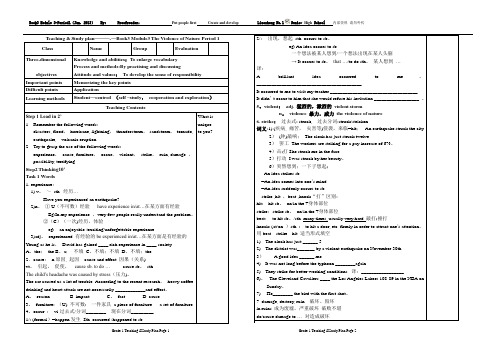
A. hurtB。damagedC。ruinedD. destroyed
7.4。Not all __________ scenes were cut from the film before it came to show,so it was not good for the children.A.popular B. valuable C. violentD. difficult
A. exercises ; experiences B. practices;experience
C. practice ; experience D. exercise;experiences
2.I just wonder if __ ever__ that you could have your own enterprise and run it yourself when you were still a student。
5。violent:adj.猛烈的,激烈的violent storm
n。violence暴力,威力the violence of nature
6. strike:过去式:struck,过去分词:struck/stricken
词义:1) (疾病,痛苦,灾害等)侵袭,来临=hit;An earthquake struck the city
2/:出现,想起sth.occursto sb。
eg:An idea occursto sb.
一个想法被某人想到/一个想法出现在某人头脑
→It occurs to sb。that …/to do sth。某人想到…
外研版高中英语必修三module3教案汇编
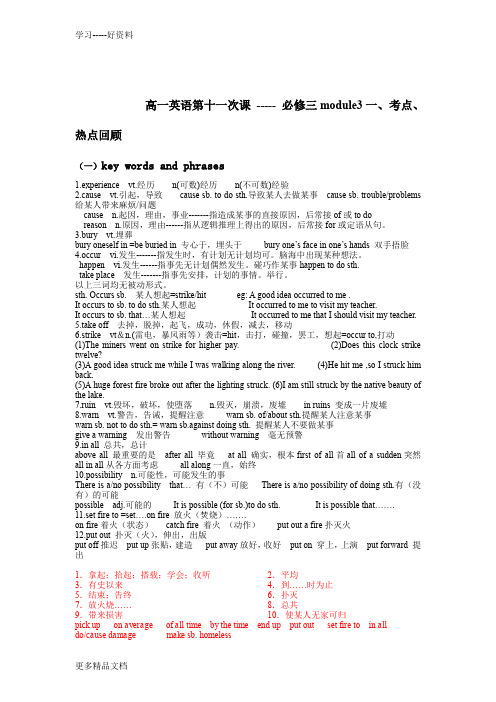
学习-----好资料高一英语第十一次课----- 必修三module3一、考点、热点回顾(一)key words and phrases1.experience vt.经历n(可数)经历n(不可数)经验2.cause vt.引起,导致cause sb. to do sth.导致某人去做某事cause sb. trouble/problems 给某人带来麻烦/问题cause n.起因,理由,事业-------指造成某事的直接原因,后常接of或to doreason n.原因,理由------指从逻辑推理上得出的原因,后常接for或定语从句。
3.bury vt.埋葬bury oneself in =be buried in 专心于,埋头于bury one’s face in one’s hands 双手捂脸4.occur vi.发生-------指发生时,有计划无计划均可。
脑海中出现某种想法。
happen vi.发生------指事先无计划偶然发生。
碰巧作某事happen to do sth.take place 发生-------指事先安排,计划的事情。
举行。
以上三词均无被动形式。
sth. Occurs sb. 某人想起=strike/hit eg: A good idea occurred to me .It occurs to sb. to do sth.某人想起It occurred to me to visit my teacher.It occurs to sb. that…某人想起It occurred to me that I should visit my teacher.5.take off 去掉,脱掉,起飞,成功,休假,减去,移动6.strike vt&n.(雷电,暴风雨等)袭击=hit,击打,碰撞,罢工,想起=occur to,打动(1)The miners went on strike for higher pay. (2)Does this clock strike twelve?(3)A good idea struck me while I was walking along the river. (4)He hit me ,so I struck him back.(5)A huge forest fire broke out after the lighting struck. (6)I am still struck by the native beauty of the lake.7.ruin vt.毁坏,破坏,使堕落n.毁灭,崩溃,废墟in ruins 变成一片废墟8.warn vt.警告,告诫,提醒注意warn sb. of/about sth.提醒某人注意某事warn sb. not to do sth.= warn sb.against doing sth. 提醒某人不要做某事give a warning 发出警告without warning 毫无预警9.in all 总共,总计above all 最重要的是after all 毕竟at all 确实,根本first of all首all of a sudden突然all in all从各方面考虑all along一直,始终10.possibility n.可能性,可能发生的事There is a/no possibility that… 有(不)可能There is a/no possibility of doing sth.有(没有)的可能possible adj.可能的It is possible (for sb.)to do sth. It is possible that…….11.set fire to =set….on fire 放火(焚烧)…….on fire着火(状态)catch fire 着火(动作)put out a fire扑灭火12.put out 扑灭(火),伸出,出版put off推迟put up张贴,建造put away放好,收好put on 穿上,上演put forward 提出1.拿起;拾起;搭载;学会;收听2.平均3.有史以来4.到……时为止5.结束;告终6.扑灭7.放火烧…… 8.总共9.带来损害10.使某人无家可归pick up on average of all time by the time end up put out set fire to in alldo/cause damage make sb. homeless选词填空in all,set fire to,by the time,pick up,on average1. __________ you arrive, I will have left.2.__________, I spend two hours doing my homework every day.3.Sorry, I have to go to _______ my son from school.4.How much money does he owe you ______?5.Have the police found out who ________ the building?(二)Language PointsOn average, there are800 trnadoes in the US each year, causing about 80 deaths and 1,500 injuries.现在分词短语作结果状语The fire burned for 3 days, destroying a total of 25,000 buildings.现在分词短语作结果状语表自然而然的结果。
新外研社版高中英语必修三Unit3The World of Science整单元学案
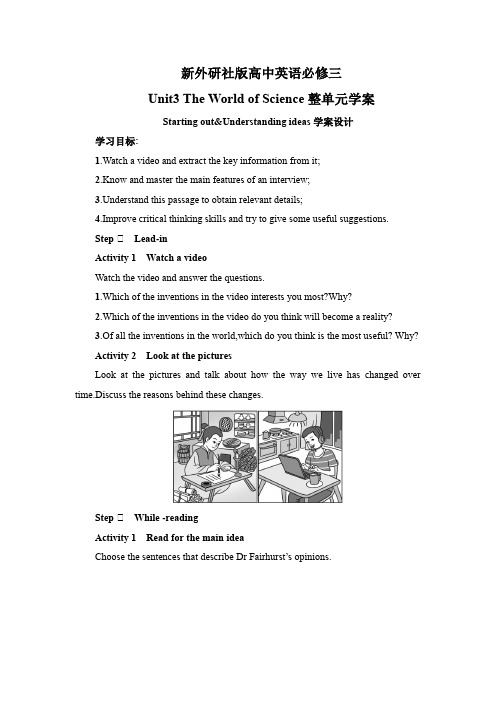
新外研社版高中英语必修三Unit3 The World of Science整单元学案Starting out&Understanding ideas学案设计学习目标:1.Watch a video and extract the key information from it;2.Know and master the main features of an interview;3.Understand this passage to obtain relevant details;4.Improve critical thinking skills and try to give some useful suggestions.Step ⅠLead-inActivity1Watch a videoWatch the video and answer the questions.1.Which of the inventions in the video interests you most?Why?2.Which of the inventions in the video do you think will become a reality?3.Of all the inventions in the world,which do you think is the most useful? Why?Activity2Look at the picturesLook at the pictures and talk about how the way we live has changed over time.Discuss the reasons behind these changes.Step ⅠWhile-readingActivity1Read for the main ideaChoose the sentences that describe Dr Fairhurst’s opinions.Activity2Language points and translation1.In addition,important advances have been made in medicine and environmental science thanks to increasing computer power.【翻译】此外,得益于不断强化的计算机能力,医药与环境科学也取得了重要进展。
英语外研版必修3全套教案文库
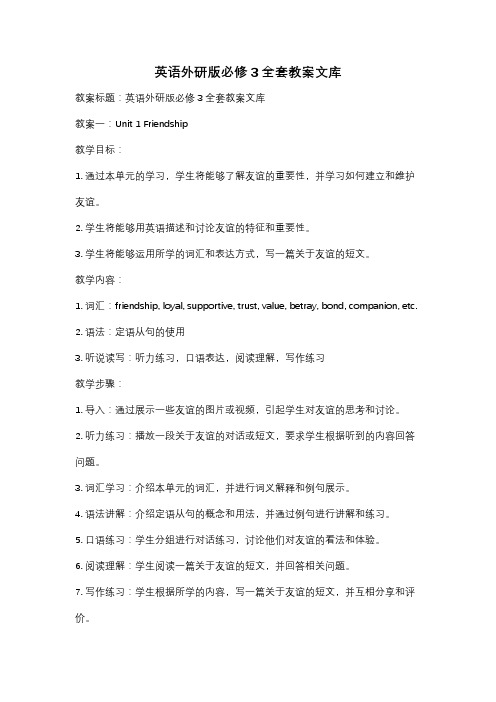
英语外研版必修3全套教案文库教案标题:英语外研版必修3全套教案文库教案一:Unit 1 Friendship教学目标:1. 通过本单元的学习,学生将能够了解友谊的重要性,并学习如何建立和维护友谊。
2. 学生将能够用英语描述和讨论友谊的特征和重要性。
3. 学生将能够运用所学的词汇和表达方式,写一篇关于友谊的短文。
教学内容:1. 词汇:friendship, loyal, supportive, trust, value, betray, bond, companion, etc.2. 语法:定语从句的使用3. 听说读写:听力练习,口语表达,阅读理解,写作练习教学步骤:1. 导入:通过展示一些友谊的图片或视频,引起学生对友谊的思考和讨论。
2. 听力练习:播放一段关于友谊的对话或短文,要求学生根据听到的内容回答问题。
3. 词汇学习:介绍本单元的词汇,并进行词义解释和例句展示。
4. 语法讲解:介绍定语从句的概念和用法,并通过例句进行讲解和练习。
5. 口语练习:学生分组进行对话练习,讨论他们对友谊的看法和体验。
6. 阅读理解:学生阅读一篇关于友谊的短文,并回答相关问题。
7. 写作练习:学生根据所学的内容,写一篇关于友谊的短文,并互相分享和评价。
教学评估:1. 口语表达评估:观察学生在口语练习中的表达能力和语法运用情况。
2. 阅读理解评估:检查学生对于友谊相关文章的理解能力和问题回答的准确性。
3. 写作评估:评估学生写作能力和对友谊的理解和表达。
教案二:Unit 2 Healthy eating教学目标:1. 通过本单元的学习,学生将能够了解健康饮食的重要性,并学习如何选择和准备健康食物。
2. 学生将能够用英语描述和讨论健康饮食的原则和方法。
3. 学生将能够运用所学的词汇和表达方式,写一篇关于健康饮食的短文。
教学内容:1. 词汇:healthy eating, balanced diet, nutrients, vitamins, minerals, carbohydrates, protein, etc.2. 语法:情态动词的使用3. 听说读写:听力练习,口语表达,阅读理解,写作练习教学步骤:1. 导入:通过展示一些健康食物的图片或视频,引起学生对健康饮食的思考和讨论。
外研版高中英语必修三模块3高中英语教学设计
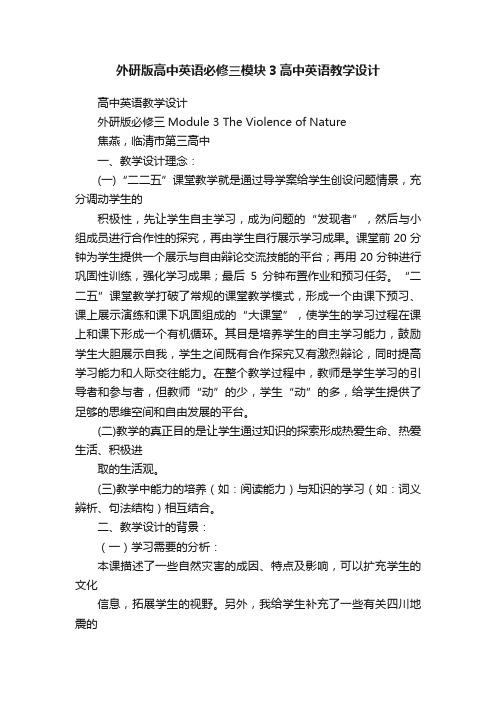
外研版高中英语必修三模块3高中英语教学设计高中英语教学设计外研版必修三Module 3 The Violence of Nature焦燕,临清市第三高中一、教学设计理念:(一)“二二五”课堂教学就是通过导学案给学生创设问题情景,充分调动学生的积极性,先让学生自主学习,成为问题的“发现者”,然后与小组成员进行合作性的探究,再由学生自行展示学习成果。
课堂前20分钟为学生提供一个展示与自由辩论交流技能的平台;再用20分钟进行巩固性训练,强化学习成果;最后5分钟布置作业和预习任务。
“二二五”课堂教学打破了常规的课堂教学模式,形成一个由课下预习、课上展示演练和课下巩固组成的“大课堂”,使学生的学习过程在课上和课下形成一个有机循环。
其目是培养学生的自主学习能力,鼓励学生大胆展示自我,学生之间既有合作探究又有激烈辩论,同时提高学习能力和人际交往能力。
在整个教学过程中,教师是学生学习的引导者和参与者,但教师“动”的少,学生“动”的多,给学生提供了足够的思维空间和自由发展的平台。
(二)教学的真正目的是让学生通过知识的探索形成热爱生命、热爱生活、积极进取的生活观。
(三)教学中能力的培养(如:阅读能力)与知识的学习(如:词义辨析、句法结构)相互结合。
二、教学设计的背景:(一)学习需要的分析:本课描述了一些自然灾害的成因、特点及影响,可以扩充学生的文化信息,拓展学生的视野。
另外,我给学生补充了一些有关四川地震的图片和英文报道,激发学生用英语获取知识和解决问题的兴趣。
(二)学习内容的分析:外研版英语教材中的每一个单元都是围绕一个独立的话题展开,包括听、说、读、写等综合技能的训练。
本单元为高一必修三第三模块,教学内容为描述自然灾害。
目的是让学生通过完成本模块的任务,能够对所学语言灵活运用,熟练掌握有关自然灾害这一话题词汇和表达句型。
并通过模块学习使学生了解地震、飓风、龙卷风等各种自然灾害的成因、过程及所造成的严重后果。
培养学生对自然科学知识的渴求,对美好生活的热爱,激发他们学好自然科学服务于生活的热情。
外研版高中英语必修3Module3Culturalcorner精品教案

外研版⾼中英语必修3Module3Culturalcorner精品教案Module3 Cultural corner 精品教案Teaching contents:Earthquakes Around the PacificTeaching important points:Learn something about earthquakes around the Pacific Teaching difficult points:Master the difficult language pointsTeaching methods:reading and explainingTeaching procedures:Step 1 Self-study: Finish the exercises on page 34 of 世纪⾦榜1 从⼀边到另⼀边___________2 持续两天_________3 总共__________4 丢掉性命_________5 发⽣___________6 ⾃然灾害_____________ Step 2 Read the article and answer the questions.1 Where was the worst Chinese earthquake?It was in Hua County in Shanxi Province.2 What was the most dangerous thing about the California Earthquake of 1906?The fires that started.3 Is it possible there could be another earthquake there?Yes, there is.Step 3 Find the useful words and phrases used to describe the earthquakesStep 4 Language points1 worldwide adj. found in the whole world 遍及全世界的In a word, worldwide economic trends are good.adv. all over the world 遍及世界各地,全世界Our products are sold worldwide.2 active adj. 活跃的;积极的be active in在…⽅⾯活跃/积极take an active part in 积极参与3 in all 总共,共计 e.g. There are twelve of us in all for dinner.That’s 25 pounds in all.all in all 总的说来above all ⾸先;最重要的是first of all⾸先;最先at all 竟然,终于not at all ⼀点也不;不⽤谢after all 到底;毕竟;终究;别忘了4 damage n. 损失;损害,损坏do damage to sth. 危害/损害… 对…造成损失e.g. The storm did a lot of damage to the crops.Step 5 Exercises1 We were fifteen____________.我们⼀共⼗五个⼈。
外研版必修三英语M3第三单元教案
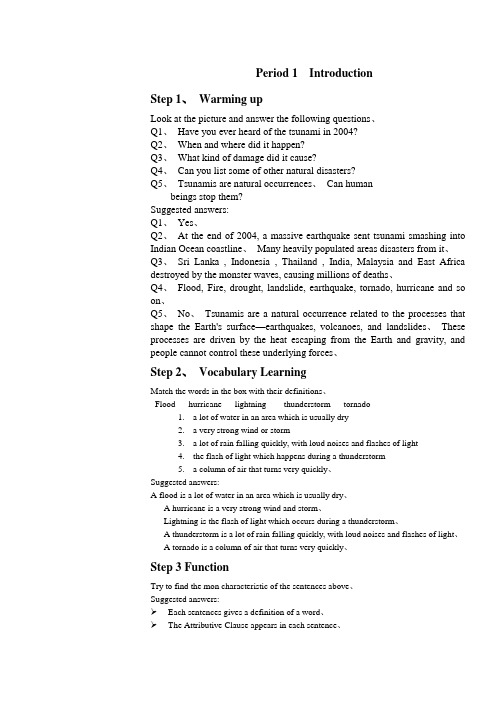
Period 1 IntroductionStep 1、Warming upLook at the picture and answer the following questions、Q1、Have you ever heard of the tsunami in 2004?Q2、When and where did it happen?Q3、What kind of damage did it cause?Q4、Can you list some of other natural disasters?Q5、Tsunamis are natural occurrences、Can humanbeings stop them?Suggested answers:Q1、Yes、Q2、At the end of 2004, a massive earthquake sent tsunami smashing into Indian Ocean coastline、Many heavily populated areas disasters from it、Q3、Sri Lanka , Indonesia , Thailand , India, Malaysia and East Africa destroyed by the monster waves, causing millions of deaths、Q4、Flood, Fire, drought, landslide, earthquake, tornado, hurricane and so on、Q5、No、Tsunamis are a natural occurrence related to the processes that shape the Earth's surface—earthquakes, volcanoes, and landslides、These processes are driven by the heat escaping from the Earth and gravity, and people cannot control these underlying forces、Step 2、Vocabulary LearningMatch the words in the box with their definitions、Flood hurricane lightning thunderstorm tornado1. a lot of water in an area which is usually dry2. a very strong wind or storm3. a lot of rain falling quickly, with loud noises and flashes of light4.the flash of light which happens during a thunderstorm5. a column of air that turns very quickly、Suggested answers:A flood is a lot of water in an area which is usually dry、A hurricane is a very strong wind and storm、Lightning is the flash of light which occurs during a thunderstorm、A thunderstorm is a lot of rain falling quickly, with loud noises and flashes of light、A tornado is a column of air that turns very quickly、Step 3 FunctionTry to find the mon characteristic of the sentences above、Suggested answers:➢Each sentences gives a definition of a word、➢The Attributive Clause appears in each sentence、➢When we give a definition of a word, the Attributive Clause is usually necessary and hopeful、We’d better learn to use the structure “A is B that/which”Step 4 PracticeGive definitions of the words following the pattern “A is B that/which”、An earthquake a volcanic eruption a plane crashSuggested answers:1.An earthquake happens when the earth shakes because of movementunderground、2. A volcanic eruption is that lava and ash ing out of a volcano、3. A plane crash is that a plane stopping flying and crashing into the earth、Step 5 Discussions4.Which kind of these natural disasters have ever experienced? Can youdescribe it?5.Have you ever read a news story about one of the events? Can you describeit?6.Do you know anything about the events? For example, what causes them?Homework:1.Surf the Internet in order to have a better understanding of natural disasters、2.Preview the passage in Reading and Vocabulary、Blackboard design:Period 2 Reading and VocabularyStep 1、Leading-inMatch up the photos with the descriptions in Activity 1 on page 2、Step 2、While ReadingI、Fast readingRead the passage quickly and answer the question:Which countries do the four cities mentioned in the passage belong to? Paris belongs to ________、Barcelona belongs to ________、Florence belongs to ________、Athens belongs to _________、II、Intensive reading1、Read the passage carefully and finish answer the questions、(1)Which of the cities are capital cities?(2)Which one is situated on the coast?(3)Which is famous for its places to eat?(4)、Which ones are or were important cities for writers and artists?(5) Which was the world’s greatest city a long time ago?2、Read the passage carefully and finish Activity 4、(1)The Eiffel Tower is a tall building in France、(2)There are a lot of restaurants and cafes in Paris、(3)Barcelona is the capital of Spain、(4)The Church of the Sagrada Familia was built in 1926、(5)The artistic movement called the Renaissance began in Florence、(6)The Uffizi Palace is a famous hotel in Florence、(7)A long time ago, Athens was the world’s most powerful city、(8) There were a lot of good writers in ancient Athens、Suggested answers:TTFFTFTT3.Match the words in the box with their definitions、(1)someone who designs buildings_____________(2)to be in a certain place、_____________(3)something that is easy to recognize, such as a building_____________(4)someone who produces novels or poems_____________(5)a large building where people can see famous pieces of art_____________(6)the art of making things out of stone and wood,etcancient architect gallery landmark locate sculpture writer _____________(7)of a time long ago_____________III、Post reading-Discussion1 What did you know about these cities before you read the text?2 What new information did you learn?3 Which of them would you most like to visit?Step IV SummaryToday we have learnt、、、、、、、Step V HomeworkCollect more information on Internet about one of the cities from the Great European cities、Examples:1 How many people live there?2 What kind of sports do they like?3 What’s their favorite food?4 What about the climate?5 What’re the geographical features?Period 3 Language ExplanationsStep 1【词条1】occur【课文原句】Almost all of them occur in the US, in the area from Texas in the southeast to South Dakota in the north、(Page23)【点拨】occur此处意为“发生”,不及物动词,没有被动语态。
外研版高中英语必修三【教学设计】Module3
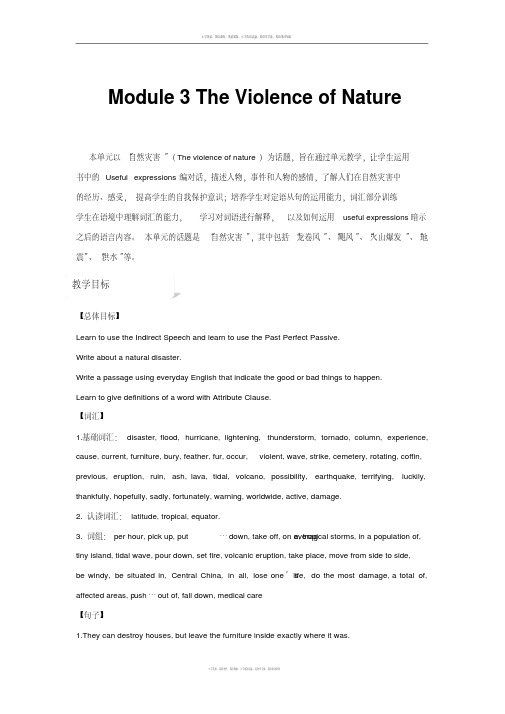
Learn to give definitions of a word with Attribute Clause. 【词汇】
1.基础词汇: disaster, flood, hurricane, lightening, thunderstorm, tornado, column, experience, cause, current, furniture, bury, feather, fur, occur, violent, wave, strike, cemetery, rotating, coffin,
Tornado
Hurricane
Definition
Place Phenomena Bad results
The
worst
example
Step 5 Post-reading Find the words and expressions in the passages and match them with their definitions.
2. 认读词汇: latitude, tropical, equator.
3. 词组: per hour, pick up, put
… down, take off, on aev, etrroapgical storms, in a population of,
tiny island, tidal wave, pour down, set fire, volcanic eruption, take place, move from side to side,
previous, eruption, ruin, ash, lava, tidal, volcano, possibility, earthquake, terrifying, luckily,
- 1、下载文档前请自行甄别文档内容的完整性,平台不提供额外的编辑、内容补充、找答案等附加服务。
- 2、"仅部分预览"的文档,不可在线预览部分如存在完整性等问题,可反馈申请退款(可完整预览的文档不适用该条件!)。
- 3、如文档侵犯您的权益,请联系客服反馈,我们会尽快为您处理(人工客服工作时间:9:00-18:30)。
eg: Many accidents occur in the home.Sth. occur to sb.→It occur to sb. that/to doeg: 1. It suddenly occurred to me that I hadn’t seen Peter all day.2. I suppose it never occurred to you to phone the police.2. pick up:eg: 1. She picked up Japanese when she was in Japan.2. The bus stopped to pick up passengers.3. A bite of something might pick you up.4. The train was gradually picking up speed.3. leave: vtleave+sb./sth. in/on…leave+sth.+adj./adv./doing/doneeg: 1. Who left the door open last night?2. You’d better leave things where you will find them again.3. He left the TV on all night.4. With these words, he went out, leaving the child crying there.was left undone.4. cause: (1) vtcause+sth././sb./sth. to doeg: 1. Heavy traffic is causing long delays on the freeway.2. This car caused me a lot of trouble.3. His illness caused him to miss the game.(2) n.cause+ofcause and effecteg: Carelessness is often the cause of fires.(u)n.+for/to doeg: You have no cause for complaint.(c)n.eg: They are fighting for a good cause.5. strike:eg: struck the table with his fist.ship struck a rock.vt.eg: 1. The church clock began to strike twelve.2. An earthquake struck/hit Wenchuan on 12th May 2008.3. A good idea struck me.4. It struck me that =It occurred to me that…strike a matchstrike homestrike a bargainstrike while the iron is hot(c)n.go on strike /be on strikecall a strikehunger strike6. end: vi.eg: The film ended with the heroine dying.end up:eg: 1. He ended up his letter with a poem.2. The meeting ended up with a song.3. He ended up as the head of the company.4. You’ll end up in prison if you’re not careful.7. bury: vt.(1) bury+sb. at/ineg: The boy buried the dead bird under the tree.(2) has buried sb.eg: He has buried both parents.(3) bury oneself in one’s work/studies(4) The dog buried its teeth in my leg.(5) bury one’s face in one’s hands(6) bury the hatchet(7) bury one’s head in the sand(8) be buried in thought8. happen: Sth. happen to sb.Sb. happen to doSb. happen on sth.It (so) happen thattake place:eg: changes have taken place in my hometown in the last 20years. will the sports meeting take place?I.单词拼写1.The Gulf Stream is a warm ocean current which starts in the Gulf ofMexico and flows northeast a______ the Atlantic.2.It also travels past the east coast of the United States t______eastern Canada.3.It is one of the s______ currents anywhere in the world.4.Because of the Gulf Stream, the United Kingdom and other places inEurope are much warmer than parts of Canada on the same l______.5.What can happen to f______ when a house is destroyed by a tornado?6.Describing the hottest parts of the earth, north and south of the______.(赤道)7. A tornado is a rotating column of air from a ______(雷雨) to theground.8.They can take the fur off the back of a cat and the ______(羽毛) offa chicken.9.Hurricanes are strong ______(热带的)storms, and they usually occurin the southern Atlantic Ocean, the Caribbean Sea and the Gulf of Mexico.10.The worst hurricane ______(灾难) of all time occurred on the 8thSeptember 1900 in Galveston, Texas.11.By the time the t______ ended, more than 700 people had been killed.12.Coghlan travelled back to Canada after he had been b______ in Texas.13.The s______ of the earthquake were the ones who stayed in the villageuntil the earthquake had finished.14.After the hurricane, Mary saw that the roof of her house had d______.15.She returned home and found all her furniture had been r______ bythe flood.16.He tried to drive back to his home before the flood had passed t______the village.17.After the earthquake, they ______(发现)that several people had beenkilled.18.Montserrat is a beautiful small ______(岛屿)in the Caribbean, only16 kilometres long and 10 kilometres wide.19.When the lava reached the sea, there was the ______(可能性)of a hugetidal wave which could flood half the island.20.And now, more information about the volcanic ______(爆发)on theisland of Montserrat in the Caribbean Sea which took place at 3am on December 26th ,one week ago.21.About 400 earthquakes occur w______ every day, more than a hundredthousand in a year.22.China is situated in one of the most a______ earthquake regions inthe world.23.And there have been many t______ earthquakes.24.The most s______ of these occurred in Hua County in Shanxi Provincein 1556.25.The earthquake a______ eight provinces in Central China.26.It covered an area of 800 ______(平方) kilometers.27.In some ______(社区)60 percent of the population were killed. In all,830,000 people lost their lives.28.The California Earthquake of the 18th of April 1906 is the ________(最厉害的)earthquake that has ever happened in the United States.29.It took place at 5:15 a.m., and ________ (持续) for only a minute.30. However, it caused the worst ________ (自然的) disaster in thenation’s history.II.短语翻译1.捡起______________2. 五米高的浪______________2.每小时400千米_______________ 4. 平均____________5. 到……时候____________6. take off __________________7. by the late 1890s_____________8. be related to ____________9. refer to _____________________ 10. find out ______________ 11.不睡觉,熬夜_______________ 12. 十千米宽_______________13. 倾盆而下__________________ 14. 在1995年7月18日________ 15. 警告……注意……__________ 16. hundreds of_________________ 17. mange to do sth. _____________ 18. put out_____________________19. inform sb. of to ________________III.在空格中填入适当的词1.______ the time the tornado end, more than 700 people had been killed.2. Coghlan traveled ______ to Canada after he had been buried in Texas.3. the survivors of the earthquake were the ones who stayed in the village ______ the earthquake had finished.4. ______ the earthquake, they discovered that several people had been killed.5. His village had been flooded ______ the heavy rain, so he moved to his parents’ house.6. When she woke ______, she found that her house had been destroyedby the thunderstorm.7. Montserrat is a beautiful small island ______ the Caribbean, only 16 kilometres long and 10 kilometres wide.8. There had been several problems ______ the volcano over the previous hundred years, but this was the first dangerous eruption.9. People were told to leave the island as ash and steam began to come ______ of the volcano, and were warned that the lava from the volcano could bury several villages.the lava reached the sea, there was the possibility ______ a huge tidal wave which could flood half the island.IV.重难句型 Do you know anyone who has experienced one of the events?2. The Gulf Stream is a warm ocean current which starts in the Gulf ofMexico and flows northeast across the Atlantic.3. They can destroyed houses, but leave the furniture inside exactlywhere it was.4. There are violent winds of 120 kilometres per hour or more, whichcause huge waves, heavy rain and floods.5. Tornadoes can pick up cars, train and even houses and put them downin the next street---or even in the next town.6. Hurricanes are strong tropical storms, and they usually occur in thesouthern Atlantic Ocean.7. On average there are 800 tornadoes in the US each year, causing about80 deaths and 1,500 injuries.8. By the time it ended, more than 700 people had been killed and 2,700had been injured.9. China is situated in one of the most active earthquake regions inthe world and there have been many terrible earthquakes.took place at 5:15 a.m. , and lasted for only a minute.I. 单项填空1. In the past two years, many villages and towns in this smallcountry______ by the storm.A floodB were floodedC have floodedD have been flooded2. If the bottle of gas______ fire, the whole building may______.A will catch, be burned to the groundB catches, be burned downC is on,burn downD will be on, be burned down happened to your car yesterday?--- There was an engine problem. But I managed______ the machine______again.A to get, runB getting, runningC to get, runningD getting,to run4. I had never spent a ______ day. I really didn’t know how to dealwith the situation.A more worryB most worryingC more worryingD more worried5. The tiring trip made all of us rather ______A tiringB tiredC tireD to be tired6. In the after-class activities, the students had plenty of ______ andgained a lot of practical______.A experience, experiencesB practices, experienceC practice, experienceD exercise,knowledge7. It ‘s dangerous to swim in the sea because the ______ is so strong here.A motionB pressureC currentD water8 Don’t leave the water______ while you brush your teeth.A runB runningC begin runD to runstorm left, ______ a lot of damage to this area.A causedB to have causedC to causeD having caused10The accident______ to the man who______ to be a foreigner, so it was hard to deal with.A occurs, happenedB happened, occurredC came about, occurredD occurred, happened11They left the house when the clock______ twelve.A struckB strikenC strikeD strikes12How many English songs ______by the end of last term?A did you learnB have you learnedC would you learnD had you learnt13Smoking too much will______ your health greatly.A affectB effectC effortD comfort14Kathy______ a lot of Spanish by playing with the native boys and girls.A picked upB took upC made upD turned up15If you know what this means, ______ the dictionary.A look upB refer toC look atD look in16By the time he realizes he______ into a trap, it’ll be too late for him to do anything about it.A walksB walkedC has walkedD had walked17---Have you known for a long time?---Yes, since she______ the Chinese Society.A has joinedB joinsC had joinedD joined18The policeman’s attention was suddenly caught by a small box which______ placed under the Minister’s car.A has beenB had beenC was beingD would be19---George and Lucy got married last week. Did you go to their wedding? ---No, I______ . Did they have a big wedding?A was not invitedB have not invitedC hadn’t invitedD didn’t invite20---Have you read a book called Waiting for Anya?---Who______ it?A writesB has writtenC wroteD had written21---The window is dirty.---I know. It______ for weeks.A hasn’t cleanedB didn’t cleanC wasn’t cleanedD hasn’t been cleaned22He_____ football regularly when he was youngA was playingB playedC has playedD had played23More patients______ in hospital this year than last year.A treatedB have treatedC had been treatedD have been treated 24In recent years many football clubs______ as business to make a profit.A have runB have been runC had been runD will run25He______ as a national hero for winning the first gold medal for hiscountry in the Olympics.A regardedB was regardedC has regardedD had been regarded26Father______ for London on business upon my arrival, so I didn’t see him.A has leftB leftC was leavingD had left27Can you make sure______ the gold ring?A where Alice had putB where had Alice putC where Alice has putD where has Alice put28He said that he had visited the park______.A last weekB a week agoC two weeks beforeD before two weeks 29He asked me ______ his story.A I likedB did you likeC whether I likeD if I liked30Tom told his teacher that he______ born in 1984.A wasB had beenC isD has been31The performance______ nearly three hours, but few people left the theatre early.A coveredB reachedC playedD lasted32The companies are working together to create______ they hope will be the best means of transport in the 21st century.A whichB thatC whatD who33As his best friend, I can make accurate guesses about______ he will do or think.A whatB whichC whomD that34Teenagers______ their health because they play computer games too much.A have damagedB are damagingC damagedD will damage35______ hunger I am, I never seem to be able to finish off this loaf of bread.A WhateverB WheneverC WhereverD However36It looks like the weather is changing for______. Shall we stick to our plan?A the worseB worseC the worstD worst37He was lucky in the accident, but his______ car is under repair. A hurt B destroyed C ruined D damaged38To buy some salt, the careless housewife went downstairs, ______ the fish ______over the gas.A left, cookedB leaving, being cookedC leaving, cookingD left, being cooked39Five hundred yuan a month could hardly______ the cost of his life in such a big city as Hangzhou.A spendB meetC takeD cover40I’d like to buy a house-modern, comfortable and ______ in a quiet neighborhood.A in allB above allC after allD at allII完形填空The train shakes back and forth, its wheels making a loud noise against the tracks. Outside the window the freezing cold of winter riles. The carriage is filled with cold, __41____ passengers. Suddenly a little boy ___42___ his way through the grown-up legs andsits down by the window. He is all alone among the___43___ grown-up. What a brave child, I think. His father ___44___ to stay by the door behind us. The train begins to crawl into a tunnel. Then something very strange happens suddenly. The___45___ little boy slides down from his seat and leans his hand on my , I think that he wants to___47___ me and return to his father, so I help him to stand up. But instead he leans forward and holds his___48___ up towards mine. He wants to say something to me, I think. I lower me head to receive the___49___. Wrong again! What I do receive is a ___50___ kiss on the cheek. The boy calmly returns to his seat, leans back and continues looking out of the window. I am ___51___. What just happened? A child kissing ___52___ grown-ups on the train. How can anybody want to kiss such a man that has so much beard? Soon enough, all of my neighbors are certainly___53___. Nervous and a little surprised, we___54___ at the father. When he sees our questioning___55___ as he gets ready for his stop, he offers a clue.“ He’s so happy to be alive,” the father says. ” He has been very sick. ”Father and son ___56___ into the crowd moving toward the exit. The doors close and the train goes on. On my cheek I can still___57____ the child’s kiss—a kiss that has triggered some soul-search inside me. How many___58___ kissing each other from the joy of being alive? How many even give much thought to the privilege of ___59___?The little kisser and taught us a sweet but serious lesson: Be careful you don’t let yourselt___60___ before your heart stops!41. A excited B tired C pleased D surprised42. A feels B fights C pushes D picks43. A unfriendly B friendly C angry D kind44. A likes B promises C chooses D agrees45. A impolite B serious C lucky D ugly46. A In no time B For a moment C In a while D Once in a while47. A kick B strike C kiss D pass48. A eye B ear C head D lip49. A news B message C kiss D opinion50. A loud B foolish C strange D fortunate51. A pleased B shocked C satisfied D interested52. A well-known B smart C unknown D familiar53. A praised B kissed C scolded D persuaded54. A stare B smile C warn D whisper55. A glances B anger C mouths D feeling56. A appear B get C disappear D follow57. A touch B trust C smell D feel58 A go around B come at C keep on D insist on59. A a child B a kiss C living D death60. A live B stop C die D sleepIII. 阅读理解(A)Diao Weihao, a business English major at the Chengdu campus of Sichuan International Studies University, was in his dormitory when,the earthquake struck at 2:30 pm on May 12. The 22-year-old felt that his chair was shaking. All of a sudden, the textbook on the bookshelf began to fall to the floor. The glass in the window broke. “It felt as if our dormitory building was being hit by a tractor,” recalled Dido. “I wasn’t afraid; I was even excited and curious. Now, looking back , it was a scary experience.”Dido and his roommates kept their calm. They didn’t try to get out of the building until the shaking stopped. They were on the fifth floor and they feared there might be trouble if they didn’t remain calm. “We’ve watched lots of disaster films,. And that helped us keep cool unconsciously, ”he said, “Only one student hurt his ankle. He was escaping in a hurry. Most of us got outside quickly and safely.”They were surprised to see so mangy students outside.“I began to realize then what had happened,”he said. The college had warned them that in the event of an earthquake, they should leave the dormitory immediately. Without any tents or bedding, the students stayed on the football field for the whole night. Rain started falling in the morning, but the students all kept in good order. They simply chatted and shared their feelings and comforted each other. “Our students seemed to have self-control,”he said. “I heard that hospitals in Chengdu have lots of injured people who jumped out of building.”Diao said, “I want to become a volunteer the damage-stricken area, or donate my blood to the injured people in hospital. Also, I will write on my blog to keep people calm and encourage them to protect themselvesduring emergencies.”Science the university is close to Dujianyan, Dido and hia classmates are still forbidden to return to their dorms or classrooms. However, they can eat in the canteen and get information about other parts of Sichuan by reading the newspapers.( ) 61. What’s the main idea of the first paragraph?A. When and where the earthquake struck.B. Where Diao Weihao studied.C. What Diao Weihao majored.D. The earthquake only hit Chengdu.( ) 62. The correct clue order of the passage is______.a. in the dormitoryb. out of the dormitoryc. at the damage-stricken aread. on the football courtA a, b, c, dB b, a, d, cC a, b, d, cD d, c, b, a ( ) 63. What does the word “ canteen” probably mean in the last paragraph?A . DormitoryB ClassroomC BuildingD Dining hall ( ) 64. What’s the author’s tone in the passage?A .Subjective B. Objective C. Negative D. Shocked ( ) 65. The passage may probably appear in the section______.A. Entertainment News C. Medicine D. Campus Life(B)British man whose wife and daughter were swept away and drowned in Spanish floods has spoken of his grief. Mark Cullen lost his wife Lorraine, 47, and one of his twin daughters Lauren, 14, after they lost their footing trying to cross a swollen river near L’Olleria , a town south of Valencia.Fellow twin Samantha,14, watched along with the girls’ Spanish friend Gemma, 14, as the pair were washed downstream. Mr Cullen, 49, said: ” My wife went to pick up Samantha from the town centre. When they drove back the water was up high over the bridge. They got out of the car, all held hands and started to walk across the river.”“It was only up to their knees, but one of them slipped and the others came crashing down. It carried them across the edge.”“ My daughter Sam is quite strong and managed to grab hold of a tree and climb up. She saw Gemma and grabbed her, but Lorraine and Lauren were gone.”Mr Cullen flew out to Valencia earlier today with his sons Daniel, 22, and Darren, 19, to be with his surviving daughter as she was treated at a local hospital. He said, “ When I saw Sam, she was absolutely covered in bruises. Nothing is broken but her body’s a mess, I’ve never seen anything like it.”He added: “ It’s a blur, you don’t expect to lose two members of your family in one hit.”Mr Cullen, a roofer and building contractor from Brighton, said he and Lorraine had just celebrated their 25th wedding anniversary.He said: “ My priority is to see my wife and daughter and bringthem back home. That’s all I can do.” The Cullen family had lived in Spain for four years and rented out their £260,000 three-bedroom semi-detached family home in Brighton to tenants.Mr Cullen would return to the UK for work for three weeks at a time and stay with friends in Newhaven, before rejoining his family in Spain. ( )’s the best title of the passage?A. Man’s grief after losing family in floods.B. L’Olleria, a town south of Valencia.C. A happy travel to EnglishD. The story of the Cullen family.( ) does the word “crash” in the 3rd paragraph mean?A. BreakB. StrikeC. HitD. Drop( ) is strong and she managed to save______.A. DarrenB. LorraineC. Gemma( ) Cullen has been married for______ years with his wife.A. 20B. 25C. 30D. 35( ) to the passage, Mark Cullen would______.A. return to Spain for three weeks at a timeB. work for three weeks in the UK at a timeC. stay with his friends in SpainD. rejoin his family in the UK短文改错.John Brown is a London taxi driver who love going tothe theatre. Last week his mother gave him two tickets for a play. The tickets were on Sunday evening. Then John read somereviews of the play, which all said it was a terribly one! He wouldn’t go to see a play that no one liked it. So two hours before the play started, he left the ticket on the back seat of his taxi. Perhaps someone who wanted see the play would take them. However, while John went back home, the tickets were still the fact, there were four tickets on theSomeone has placed another pair of tickets on top of them!第一课件网。
